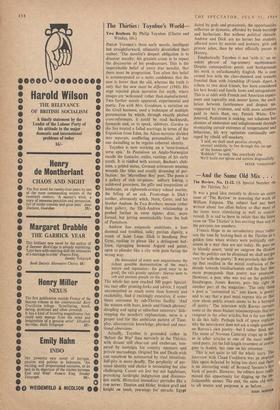The Thirties : Toynbee's World— PHILIP TOYNBEE'S three early novels,
intelligent but straightforward, ultimately dissatisfied their author. 'The novelist's deepest obligation is to discover novelty; his greatest crime is to repeat the discoveries of his predecessors. This is the imperishable belief of every true novelist, that there must be progression. Too often this belief is misinterpreted as a naïve confidence that the new is better than the old, whereas the truth is only that the new must be different' (1945). His urge rejected plain narrative for myth, where images are 'welcomed' rather than manufactured. Two further novels appeared, experimental and poetic. Tea with Mrs. Goodman, a variation on the Grail business, used a technique of multiple presentation by which, through exactly plotted cross-references, it could be read backwards, forwards and, so to speak, sideways. Garden to the Sea treated a failed marriage in terms of the Expulsion from Eden, the Adam-narrator divided into separate, conflicting personalities, all -but one dwindling as he regains coherent identity.
Toynbee is now working on a `semi-ironical verse epic.' In Pantaloon an Anglo-Norwegian recalls the fantasies, exiles, rantings of his early youth. It is riddled with avatars, Buchan's club- men, a gelded statue, German aristocrats wearing wounds like titles and crazily dreaming of per- fection: the 'Marvellous Boy' poet. The poem is a gallery of rich set-pieces: solitary fishing, a mildewed governess, the gifts and temptations of landscape, an eighteenth-century school mutiny, the felling of an oak. Front-stage is Dick's mother, alternately witch, Norn, Ceres; and his brother Andrew. In Two Brothers, mosaic rather than gallery, the Dick-Andrew relationship is probed further in verse tighter, drier, more formal, but jutting unmistakably from the hub of Pantaloon.
Andrew has enigmatic ambitions, a love damned and troubled, sulky puritan dignity, a touch of Saint Loup. Dick is headlong Peer Gynt, rushing to please like a delinquent buf- foon, zigzagging between Asgard and gutter, open to plunder like a city with guns facing the wrong way.
He demanded of every new acquaintance the richest possible demonstration of the man's nature and reputation: the good were to be good; the rich grossly opulent: thieves were to rob and parsons preach on the spot.
The whole has now reached 500 pages. Special- ists may offer pruning-forks and advice; I myself uncommitted to much more than honesty and readability, find it excitingly evocative, if some- times overcome by sub-Thirties facility. 'And the women with buns, jewels and french phrases/ dimpling and aging at suburban samovars.' Side- stepping the novelist's explanations, verse is a proper tool for this ambitious pattern of Time- play, idiosyncratic knowledge, physical and emo- tional obsessions.
Actually, Toynbee is grounded rather in `Before the War' than narrowly in the Thirties, with dissent still clear-cut and exuberant, tem- pered by nostalgia for country summers and private maraudings. Original Sin and Death-wish can somehow be outsmarted by rival intentions. Self-pity is more deadly. The perplexity of per- sonal identity and choice is tormenting but also challenging. Causes are lost but not lugubrious, provoking forthright indignation and disconso- late mirth. Historical immediacy pervades like a raw nerve: Danton and Hitler, broken grail and knight on tomb, yearnings for miracle, Egypt
dazed by gods and proconsuls, the opportunities. reflective or dynamic, afforded by book-burnings and barbarians. But without political rhetoric. Andrew and Dick are no heroes but students, affected more by movies and jealousy, girls and private jokes, than by what officially passes as History.
Emphatically Toynbee is not `with it,' an in- solent phrase of top-tennery snobbishness. Despite cosmopolitan patois and backgrounds his work is unfashionably English. He is con- cerned less with the class-damned and sexually frenzied than with friendship (Friends Apart, a tribute to two dead friends, has been considered his best book) and family loves and antagonisms. This is at odds with French and American experi- ment and topicality and, nearer home, the oscil- lation between facetiouness and despair un- supported by evidence, and with more attention paid to Amis than, say, Patrick White. Un- deterred, Pantaloon is seeking, not solutions but chances of endurance and enlightenment through re-enacting corsair extremes of temperament and behaviour, his wry optimism continually out- raged by ribald self-mockery.
`I said, we shall need peculiar strength,
unusual assiduity, to live through this ice-age of the human spirit.'
'Rubbish!' he said, 'like everybody else We'll build our igloos and survive disgracefully.'






























 Previous page
Previous page